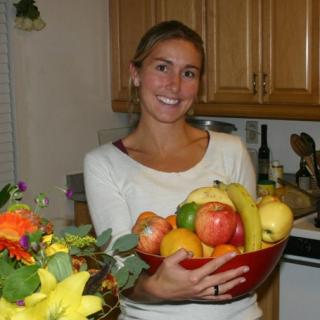Beyond the Green Bin: Dana Frasz, Food Shift
April 18, 2014
 Dana Frasz is the founder and director of Food Shift, which works with communities, businesses, and government to shift behaviors toward a more sustainable use of food. Food Shift’s programs increase awareness and action around food waste reduction; decrease the amount of edible food rotting in the landfill; and create jobs in the food recovery sector.
Dana Frasz is the founder and director of Food Shift, which works with communities, businesses, and government to shift behaviors toward a more sustainable use of food. Food Shift’s programs increase awareness and action around food waste reduction; decrease the amount of edible food rotting in the landfill; and create jobs in the food recovery sector.
Following are Dana’s responses to audience questions that did not get answered during the panel discussion “Beyond the Green Bin,” co-hosted by CUESA and the Commonwealth Club on March 24, 2014.
Read the full recap and listen to audio of the talk »
Q: Do you just target retail and consumer food waste, or are you looking at addressing farm food waste? If so, will your model therefore compete with CropMobster?
Dana: Food Shift is not currently addressing farm food waste. We view CropMobster and other organizations and platforms in the space as allies rather than competitors. We are all in this together and all our efforts are needed to move the needle on this issue.
Q: Are you working with caterers, hotels, and event planners to recover and donate food?
Dana: Yes, absolutely. Food Shift is currently in the design and planning stages of a service that will provide customized assistance around food recovery to caterers, hotels, and event planners. We are also exploring the potential for technology integration to make it easier for food donors to connect with food recovery organizations easily and efficiently.
Q: Are you working with the US military to reduce food waste?
Dana: Not yet, but it’s an excellent idea! So much of reducing food waste is about logistics. There is definitely a place at the table for military to share their expertise!
Q: What roles do food banks play in rescuing stranded food? Why aren’t you working with food banks?
Dana: Food banks play a huge and essential role in capturing and redistributing surplus food and Food Shift would love to work more closely with food banks. It’s important to note that food banks are generally going after large quantities of surplus food from farms, manufacturers, or large grocery chains. That leaves smaller quantities of food from grocers, delis, restaurants, and catered events without a formalized system for food recovery. That is the gap that Food Shift and other food recovery groups like Food Runners are working to fill.
Q: What kind of food infrastructure is needed to support reducing food waste?
Dana: We need everything from containers to technology to education to policy changes! That’s why Food Shift is focused on education, advocacy, and action. Based on our work in Oakland we’ve learn that many food assistance organizations throughout the region are in need of food but are unaware of its location, lack legitimate credentials, and don’t have the resources, staff, and infrastructure to secure, store, and distribute food effectively. The food recovery space is in great need of investment to support staff, technology solutions, transportation, logistics, and refrigeration. As a nation we spend $750 million each year to dispose of surplus food that could be donated. We need to shift some of those resources toward the recovery and redistribution of food instead.
Topics: Waste
